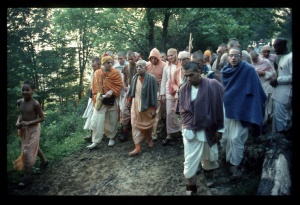CC Adi 17.250: Difference between revisions
m (1 revision(s)) |
No edit summary |
||
| Line 1: | Line 1: | ||
{{ | [[Category:Sri Caitanya-caritamrta - Adi-lila Chapter 17|C250]] | ||
<div style="float:left">'''[[Sri Caitanya-caritamrta|Śrī Caitanya-caritāmṛta]] - [[CC Adi|Ādi-līlā]] - [[CC Adi 17|Chapter 17: The Pastimes of Lord Caitanya Mahāprabhu in His Youth]]'''</div> | |||
<div style="float:right">[[File:Go-previous.png|link=CC Adi 17.249|Ādi-līlā 17.249]] '''[[CC Adi 17.249|Ādi-līlā 17.249]] - [[CC Adi 17.251|Ādi-līlā 17.251]]''' [[File:Go-next.png|link=CC Adi 17.251|Ādi-līlā 17.251]]</div> | |||
{{CompareVersions|CC|Adi 17.250|CC 1975|CC 1996}} | |||
{{RandomImage}} | |||
==== TEXT 250 ==== | ==== TEXT 250 ==== | ||
<div | <div class="verse"> | ||
śuni’ prabhu krodhe kaila kṛṣṇe doṣodgāra | :śuni’ prabhu krodhe kaila kṛṣṇe doṣodgāra | ||
ṭheṅgā lañā uṭhilā prabhu paḍuyā māribāra | :ṭheṅgā lañā uṭhilā prabhu paḍuyā māribāra | ||
</div> | </div> | ||
| Line 12: | Line 16: | ||
==== SYNONYMS ==== | ==== SYNONYMS ==== | ||
<div | <div class="synonyms"> | ||
''śuni’''—hearing; ''prabhu''—the Lord; ''krodhe''—in anger; ''kaila''—did; ''kṛṣṇe''—unto Lord Kṛṣṇa; ''doṣa-udgāra''—many accusations; ''ṭheṅgā''—stick; ''lañā''—taking; ''uṭhilā''—got up; ''prabhu''—the Lord; ''paḍuyā''—the student; ''māribāra''—to strike. | |||
</div> | </div> | ||
| Line 19: | Line 23: | ||
==== TRANSLATION ==== | ==== TRANSLATION ==== | ||
<div | <div class="translation"> | ||
Hearing the foolish student, the Lord became greatly angry and rebuked Lord Kṛṣṇa in various ways. Taking up a stick, He rose to strike the student. | Hearing the foolish student, the Lord became greatly angry and rebuked Lord Kṛṣṇa in various ways. Taking up a stick, He rose to strike the student. | ||
</div> | </div> | ||
| Line 26: | Line 30: | ||
==== PURPORT ==== | ==== PURPORT ==== | ||
<div | <div class="purport"> | ||
It is mentioned in Śrīmad-Bhāgavatam that when Uddhava came from Lord Kṛṣṇa with a message for the gopīs, all the gopīs, especially Śrīmatī Rādhārāṇī, denounced Kṛṣṇa in various ways. Such denunciations, however, reflect an exuberant loving attitude that an ordinary man cannot understand. When the foolish student questioned Lord Śrī Caitanya Mahāprabhu, Lord Caitanya similarly rebuked Lord Kṛṣṇa in loving exuberance. When Śrī Caitanya Mahāprabhu was in the mood of the gopīs and the student advocated the cause of Śrī Kṛṣṇa, Lord Caitanya was greatly angry. Seeing His anger, the foolish student, who was an ordinary atheistic smārta-brāhmaṇa, foolishly misjudged Him. Thus he and a party of students were ready to strike the Lord in retaliation. After this incident, Śrī Caitanya Mahāprabhu decided to take sannyāsa so that people would not commit offenses against Him, considering Him an ordinary householder, for in India even now a sannyāsī is naturally offered respect. | It is mentioned in [[Srimad-Bhagavatam|''Śrīmad-Bhāgavatam'']] that when Uddhava came from Lord Kṛṣṇa with a message for the ''gopīs'', all the ''gopīs'', especially Śrīmatī Rādhārāṇī, denounced Kṛṣṇa in various ways. Such denunciations, however, reflect an exuberant loving attitude that an ordinary man cannot understand. When the foolish student questioned Lord Śrī Caitanya Mahāprabhu, Lord Caitanya similarly rebuked Lord Kṛṣṇa in loving exuberance. When Śrī Caitanya Mahāprabhu was in the mood of the ''gopīs'' and the student advocated the cause of Śrī Kṛṣṇa, Lord Caitanya was greatly angry. Seeing His anger, the foolish student, who was an ordinary atheistic ''smārta-brāhmaṇa'', foolishly misjudged Him. Thus he and a party of students were ready to strike the Lord in retaliation. After this incident, Śrī Caitanya Mahāprabhu decided to take ''sannyāsa'' so that people would not commit offenses against Him, considering Him an ordinary householder, for in India even now a ''sannyāsī'' is naturally offered respect. | ||
</div> | </div> | ||
__NOTOC__ | |||
<div style="float:right; clear:both;">[[File:Go-previous.png|link=CC Adi 17.249|Ādi-līlā 17.249]] '''[[CC Adi 17.249|Ādi-līlā 17.249]] - [[CC Adi 17.251|Ādi-līlā 17.251]]''' [[File:Go-next.png|link=CC Adi 17.251|Ādi-līlā 17.251]]</div> | |||
__NOTOC__ | |||
__NOEDITSECTION__ | |||
Revision as of 13:40, 26 July 2021

A.C. Bhaktivedanta Swami Prabhupada
TEXT 250
- śuni’ prabhu krodhe kaila kṛṣṇe doṣodgāra
- ṭheṅgā lañā uṭhilā prabhu paḍuyā māribāra
SYNONYMS
śuni’—hearing; prabhu—the Lord; krodhe—in anger; kaila—did; kṛṣṇe—unto Lord Kṛṣṇa; doṣa-udgāra—many accusations; ṭheṅgā—stick; lañā—taking; uṭhilā—got up; prabhu—the Lord; paḍuyā—the student; māribāra—to strike.
TRANSLATION
Hearing the foolish student, the Lord became greatly angry and rebuked Lord Kṛṣṇa in various ways. Taking up a stick, He rose to strike the student.
PURPORT
It is mentioned in Śrīmad-Bhāgavatam that when Uddhava came from Lord Kṛṣṇa with a message for the gopīs, all the gopīs, especially Śrīmatī Rādhārāṇī, denounced Kṛṣṇa in various ways. Such denunciations, however, reflect an exuberant loving attitude that an ordinary man cannot understand. When the foolish student questioned Lord Śrī Caitanya Mahāprabhu, Lord Caitanya similarly rebuked Lord Kṛṣṇa in loving exuberance. When Śrī Caitanya Mahāprabhu was in the mood of the gopīs and the student advocated the cause of Śrī Kṛṣṇa, Lord Caitanya was greatly angry. Seeing His anger, the foolish student, who was an ordinary atheistic smārta-brāhmaṇa, foolishly misjudged Him. Thus he and a party of students were ready to strike the Lord in retaliation. After this incident, Śrī Caitanya Mahāprabhu decided to take sannyāsa so that people would not commit offenses against Him, considering Him an ordinary householder, for in India even now a sannyāsī is naturally offered respect.